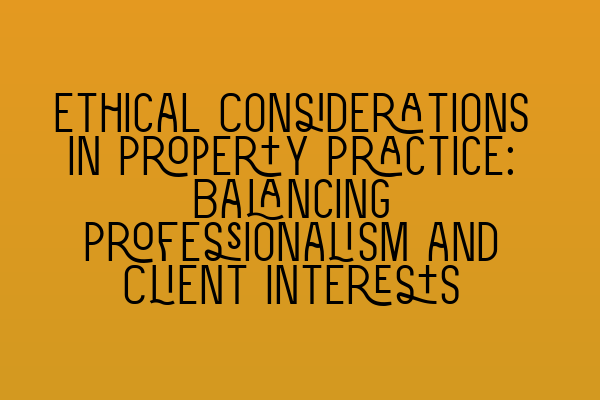Ethical Considerations in Property Practice: Balancing Professionalism and Client Interests
Property practice is a complex field that requires solicitors to navigate various legal, professional, and ethical considerations. As legal professionals, it is crucial to strike a balance between maintaining professionalism and prioritizing the best interests of our clients. In this blog post, we will explore the ethical considerations that arise in property law and discuss how solicitors can navigate these challenges.
The Duty of Confidentiality
One of the fundamental ethical obligations of a solicitor is to maintain client confidentiality. This duty extends to all aspects of property practice, including client communications, information sharing, and case-related discussions. Upholding client confidentiality builds trust and ensures that clients feel safe disclosing sensitive information. By maintaining strict confidentiality, solicitors can demonstrate their professionalism and dedication to their clients’ interests.
Conflict of Interest
Conflict of interest is another crucial ethical consideration in property practice. Solicitors must ensure that they avoid any situations where their personal interests may conflict with their clients’ interests. This means disclosing any potential conflicts and seeking the client’s informed consent to proceed. By addressing and managing conflicts of interest, solicitors can maintain their professionalism and protect their clients’ interests.
Transparency and Full Disclosure
Transparency and full disclosure are essential in property practice to ensure clients have access to all relevant information. Whether it involves property transactions, contracts, or negotiations, solicitors must be transparent about potential risks, costs, and legal implications. Providing clients with comprehensive information allows them to make informed decisions and promotes professionalism in the practice. Failure to provide full disclosure can lead to ethical issues and potential legal repercussions.
Keeping Abreast of Legal Developments
As property law is subject to constant changes and updates, it is essential for solicitors to stay up-to-date with the latest legal developments. Regular legal research, attending professional development courses, and maintaining memberships in professional organizations can help solicitors leverage their expertise and provide accurate advice to clients. Staying informed not only demonstrates professionalism but also ensures that clients benefit from the most current legal knowledge.
Avoiding Unethical Practices
Unethical practices, such as engaging in fraudulent activities or breaching client trust, have no place in property practice. Solicitors must adhere to strict ethical standards to protect their professional reputation and the interests of their clients. By maintaining high ethical standards, solicitors demonstrate their commitment to professionalism and contribute to the overall integrity of the legal profession.
Conclusion
Property practice requires solicitors to navigate a range of ethical considerations while ensuring the best interests of their clients. Upholding confidentiality, managing conflicts of interest, promoting transparency, staying informed, and avoiding unethical practices are essential elements of maintaining professionalism in property law. By striking a balance between these considerations and client interests, solicitors can provide effective legal representation while maintaining the ethical integrity of the profession.
For more information on SQE 1 and SQE 2 preparation courses, visit our website:
- SQE 1 Practice Exam Questions
- SQE 1 Practice Mocks FLK1 FLK2
- SQE 2 Preparation Courses
- SQE 1 Preparation Courses
- SRA SQE Exam Dates
